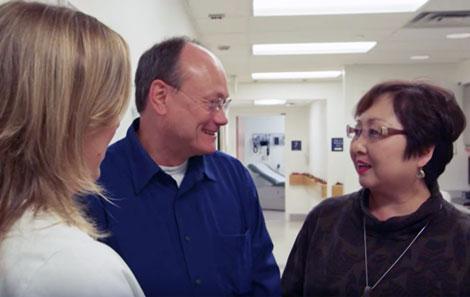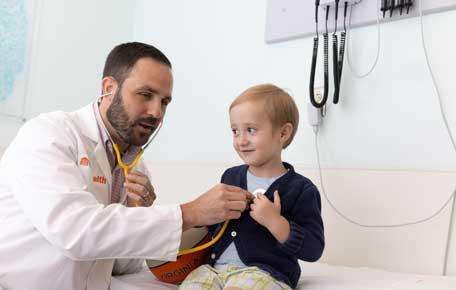Living Organ Donation

Become a Donor: Kidney & Liver
For people with end-stage liver or kidney disease, an organ transplant can offer a chance at a full life. But a person can be on the waiting list for an organ for a long time. Living organ donors can save lives by donating an organ while they're still alive.
Living organ donation is only an option for kidney and liver transplants. (Living donations are not an option for pancreas, heart, or lung transplants.)
What is a Living Donor?
A living donor is someone who donates their kidney or part of their liver to another person. Both people you know and strangers can become a living donor. See how living organ donors can donate:
Living Organ Donation Saved Baby Josie's Life
Josie's biliary atresia meant her liver was in rough shape and she needed a transplant. Christina Miller's living liver donation saved baby Josie's life.
When Kelli Curvin noticed a yellow tint in her baby daughter's eyes, it was the first sign of liver failure from a condition called biliary atresia. In a partnership between CHKD hospital and UVA Health, Kelli was able to find a living donor to save her daughter's life.
Transcript
KELLI CURVIN
Hi, I'm Kelli Curvin. I'm 38. Born and raised in Chesapeake, Virginia. Josie is one of five. She's the youngest and the only girl. I have four boys before her. We were outside and I noticed that the whites of her eyes looked just ever so yellow. We came to CHKD. They did an ultrasound and more labs, and they essentially told me that she was in liver failure.
FRANK DiPAOLA, MD
Josie came to us at UVA as a transfer from CHKD. So Josie was diagnosed with biliary atresia, which is a disease of the bile ducts of the liver. The primary treatment is a surgical therapy we call Kasai. Unfortunately, Josie was fairly sick by the time she came to us, so it became apparent fairly early on that she would need a transplant.
ANITA SITES, AG-ACNP
There's close to 20,000 people waiting for liver transplant in the United States, and there are just not enough deceased donor organs to supply all those people in need.
NICOLAS GOLDARACENA, MD
In a living donor, a patient who is alive and healthy donates a portion of their liver to someone in need. That's why we are making a huge effort to grow this living donor program at UVA.
CHRISTINA MILLER
On Facebook, a friend of mine had shared a post about a baby who needed a liver transplant.
KELLI CURVIN
She messaged me and said that God had put it on her heart that she wanted to be Josie's living donor.
CHRISTINA MILLER
She was, of course, very receptive to it, I think, as any mother would be who's fighting for their child in a situation like that. So she was very welcoming to me.
KELLI CURVIN
When she was in surgery and we had to wait so long for 10 hours, I felt helpless. I wish that it could have been me instead of her.
CHRISTINA MILLER
I do remember one of my first questions when I got up to the room after the surgery is, "How's Josie?" And I remember them telling me that, you know, it was almost immediate. Like after the liver went in, like, her color came back to her body. It was just a deep sigh of relief to know that everything went okay for her.
CHRISTINA MILLER
Like how it was planned.
KELLI CURVIN
We spent her her first birthday at the hospital, and that was amazing. The whole transplant team bought gifts and wrapped them. We sang Happy Birthday. They started out as, you know, just doctors and nurses, but we've spent a lot of time together. So, yeah, they're like family.
FRANK DiPAOLA, MD
If you look at centers across the country, living donor is about 10% of the total volume of pediatric liver transplants. We're going to do half of our transplants this year as living donor transplants. That allows us to get kids to transplant sooner.
ANITA SITES, AG-ACNP
Without donors, whether they be deceased or living donors, we wouldn't be able to transplant people. So donors are, of course, the heroes of transplant no matter how you look at it. But living donors are especially special, and I'm very biased., but I do think that they're the most special patient population you could ever take care of because they are giving of themselves in the most ultimate way.
ANITA SITES, AG-ACNP
It's a major abdominal surgery that that person doesn't need.
KELLI CURVIN
Her prognosis is great. She's thriving. A year ago, she weighed fourteen pounds and couldn't set up on her own. And now she's about to start walking and she's close to thirty pounds.
CHRISTINA MILLER
It actually happened to be on my birthday a few weeks ago that Kelli sent this video of Josie taking her first steps. It was just it was just really special to be able to witness that.
ANITA SITES, AG-ACNP
Christina does not like to have a lot of attention placed on her, so she's just another one of my really special patients who helped this precious little baby have a new chance at life.
Our First Commitment: Donor Health
Becoming a living donor is a selfless act. Living donation isn't for everyone. But by knowing the facts, you can decide if this option is the right choice for you.
For a living organ donation to happen, everyone involved must agree to it:
- You, the living donor
- The patient getting the donated organ (the recipient)
- Our medical team
We carefully screen everyone who could become a donor. We need to make sure you're:
- Physically healthy
- Psychologically healthy
- Aware of the risks and benefits of organ donation.
Our Donor Evaluation Team includes a social worker, an independent living donor advocate, and psychologists who work with donors to ensure your well-being. We're committed to making the process safe and successful for everyone involved.
Patient Education Resources : Kidney Transplant
September 4, 2025
06084 Spanish - ERAS Kidney Donor Handbook
September 4, 2025
06084 - ERAS Kidney Donor Handbook
How Can I Donate?
- Living Kidney DonationKidney Donor Sign-Up
At UVA Health, we performed our first living kidney donation in 1969. You can trust we have the experience to care for you while you care for someone else.
- Living Liver DonationLiver Donor Sign-Up
Living donor liver transplants have been performed at UVA Health since 1999. When you donate part of your liver, we support and care for you with experience you can trust.
- Become an Organ DonorBecome an Organ Donor
You can save lives. Plan to donate your organs. Or, as a living donor, you can give now to someone in need.






